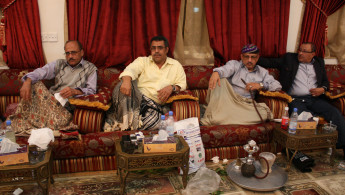Yemen's intellectuals think free
Yemeni intellectuals are political beings by nature and the ideological incubators for the country's cultural movement.
Civil strife in Yemen has damaged their position in society, however, and Saudi-led air raids have forced the thinkers to face reality.
All united
Yemeni intellectuals have been forced to state their position about what is happening in the country within harsh dogmatic binaries.
Moral and cultural reference points have disintegrated and Yemen faces its most serious political and social polarisation in centuries.
Writers discuss events in the country, and the reader should remember the unfair terms of the game that have been imposed on the people. This is especially true of Yemen's intellectual and political elites.
This explains the difficulty of formulating a position through freethinking intellectual thinking, which is not infected by the broad lines drawn by the warring parties.
Huda Jafar, an author and film critic, believes that her role as an intellectual does not differ from that as a Yemeni.
"My role is to completely avoid anything that would exacerbate strife and divisions and to engage in everything that could preserve what remains of societal peace here in Yemen," she said.
However Jafar also believes that the current situation in Yemen is a direct result of the country being used as an arena for regional wars and sectarian, political and localist alignments.
The Saudi-led attack on the country is just the latest example of this and it has brought divisions to both the north and south of the country.
Jafar hopes the air raids will end and political problems will be resolved politically.
Ahmed al-Salami, a poet, agrees with Jafar.
"[I] remain a citizen at the end of the day and my role should be conciliatory rather than divisive."
He is concerned about the religious polarisation in the country, which has "expanded like a balloon", and describes the Houthis as "a Shia-style Salafi group" who have formed a localist alliance with the head of the previous regime - Ali Abdullah Saleh.
He says that Yemeni intellectuals are afraid of working in a tribal setting where membership is based on "pre-national and pre-political groupings".
| The new generation of Saudi leaders have turned Yemen from a back yard to a back dump. - Ammar al-Yemeni, musician |
Salami believes that due to foreign interference, it is difficult to talk about his homeland belonging to Yemenis.
"Should we ask the regional and international community to leave us alone until we establish a cohesive nation and society? All wars are blind and stupid no matter how acceptable and specific their goals might be at the start.
"As a Yemeni, I announce my opposition to the [military] intervention on moral, political and cultural grounds," he said.
He says that bombs will not help Yemen or destroy the Houthi militias, but will kill innocent people.
Fathi Abu al-Nasr, an author and poet, condemned the current situation as "having no relation to the modern age or the larger dream that unites Yemenis".
Free thinkers
He considers the Saudi-led attack to be an exacerbation of sectarianism and "uncalculated regional adventure".
"The Houthis have an obsessive preoccupation with themselves that is non-democratic and prejudicial."
The anarchy of war has led to a revival of al-Qaeda, which is only concerned with the "regressive concept of the caliphate".
"The Houthis' use of force in their political practice is one of the main reasons for pessimism about the future of Yemen," he says.
Despite his pessimism, Abu al-Nasr still hopes that a free and democratic Yemen will emerge from the bloodshed.
Yet he fears that he could wake up one day and he won't find a Yemen exisiting.
Abdul Salam al-Kabsi, a poet and academic, considers "the Saudi aggression" to be the tragedy.
It breaks with Arab ideals and marks a new era for the region marked with uncertainty, chaos and collapse.
Kabsi supports the Houthis, and says a real intellectual is the one who stands on the side of his country and "defends it like a samurai warrior".
The leftist writer and poet Mohammad Abul Wahhab al-Shaybani said that what is happening in Yemen is a war between Iran and Saudi Arabia.
Iran is fighting indirectly through the Houthis and Saleh, while Saudi's role in the conflict is more obvious.
Ammar al-Yemeni, a musician, agrees that Yemen is the battlground between centres of power.
"Whoever thinks that they are acting for the interest of the country is deluded and does not represent our aspirations. No rational person views Decisive Storm as a rescue mission and we can foretell its results from the lessons of Afghanistan, Iraq, Syria and Libya," he said.
Yemeni said the new generation of Saudi leaders have turned Yemen from a back yard to a back dump.
This article is an edited translation from our Arabic edition.



